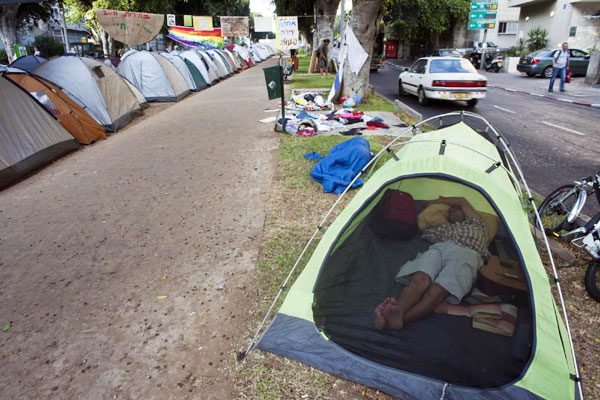Politics
Israelis pitch tents to protest house prices
Updated: 2011-07-21 11:32
(Agencies)
|
 An Israeli protester sleeps inside his tent pitched on Tel Aviv's Rothschild Boulevard as he takes part in a demonstration against high housing prices, July 18, 2011. [Photo/Agencies] |
Though lacking leadership, last week's tent demonstration on Tel Aviv's Rothschild Boulevard has spread to other cities and fired debate over the sustainability of an economy in which the middle class face high taxes and relatively low wages.
'I will be here as long as it takes,' said Daphni Leef, a 25-year-old video editor who was the first to camp.
She said she was frustrated that she was forced to spend half her monthly paycheck on rent. 'I do not mind being here until I am 30, because if this will not become a priority, we do not have a future.'
Analysts say there is no immediate threat to the stability of Netanyahu's broad coalition government but the right-wing leader has responded by speeding initiatives to free up state-owned land for sale and review property tax regulations.
Israel said this week it would issue tenders for thousands of new homes, including 294 in the occupied West Bank -- defying Palestinians and world powers trying to broker a peace accord.
Yet such moves take months or years and are unlikely to affect Tel Aviv, Israel's congested commercial hub, or Jerusalem, both short of undeveloped land.
FOREIGN CASH
One proposal made by tent protesters was for vacation homes to be taxed, a measure unlikely to be welcomed by the levy-wary Netanyahu, who has been accused of pandering to the rich.
Other suggestions include allocating more properties for poorer residents and instituting rent-control regulations.
Israel's central bank has blamed the crisis on a drop in its key interest rate to 0.5 percent after a global financial crisis in late 2008, which prompted people to take loans for houses or speculate on them.
It has responded with 10 interest-rate hikes since August 2009 to bring the rate to 3.25 percent. The bank has also tightened restrictions on mortgages to try to slow the rate of price increases.
'What worries the Bank of Israel is that there could be a disorderly collapse in housing prices,' said Jonathan Katz, an economist at HSBC. He added that more interest rate increases to about 4.25 percent was needed, although some of the central bank's measures could work and be a substitute for rate hikes.
Despite widespread public sympathy for the tent protesters, some Israeli commentators questioned whether their demands would be met, especially given rival public actions such as strikes in hospitals and other state sectors.
'You are slaves,' wrote the best-selling Yedioth Ahronoth newspaper in a front-page tribute to the demonstrators. 'At the end of the day, something will always happen that will enable the government to raise the flag of patriotism and wave it in the face of the slaves, so that they will fall silent.'
E-paper

The perfect cut
Companies need to revamp, standardize to stave off quality challenges
Crowning achievement
Living happily ever after
Let there be smell
Specials

My China story
Foreign readers are invited to share your China stories.

90th anniversary of the CPC
The Party has been leading the country and people to prosperity.

Setting the pace in Turkey
China is building a 158-km high-speed railway in Turkey.
